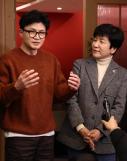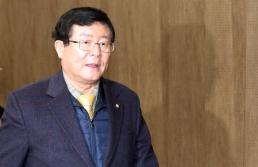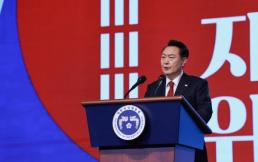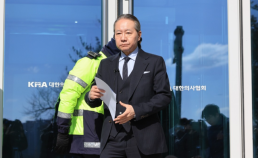Ho-Am faced a variety of enemies and crises from the first day to establish his own business with 300 bags of rice on mortgage until his company Samsung became one of top leading global corporations.
He was a manager of know-how to efficiently overcome hindrance and his judgment was swift and precise when it comes to push forward and step back in the business world with endless competition and crisis. Once the plan was all set go, Ho-Am had never missed the chance to gain momentum by implementing given tasks with boldness amid the difficulties.
Today’s Samsung is rooted from his management style with perfect analysis on and prompt response to surrounding circumstances.
From the beginning as the businessman, he could not help having a big match to fight against existing companies with high market share. Ho-Am started a rice mill business in Masan where the market scale was smaller than in other big cities of Korea.
But, the market was not welcoming enough for a start-up to incubate the business because of Japanese rice-polishing companies with support from then colonial government which handed over the land of Korean peninsula to Japanese. As a result, he had to see two thirds of his asset disappearing one year after the establishment.
It was the first time to show his ability as an entrepreneur with spirit to challenge. His strategy was to go against the major trend. He took a selling position when there were words in the market on rise in rice price and purchasing position as he heard a rumor on falling price. His bet was successful, leaving him with a huge profit in the business.
Ho-Am also encountered several challenges during the process of establishing Cheil Textiles.
Even before the opening of business, he had to face with a gossip saying, “Ho-Am seems to think that business affairs in the world will go smooth and easy after the success in Cheiljedang by luck…It is an absurd idea to compete with textile makers from England with 400-year history.”
One American company providing machines for woolen fabrics also gave pressure on him, claiming that Korean companies should buy its machineries since their country was receiving aid from the U.S.
“I would fly into the sky if Korea could make any products with quality within 3 years from the factory built by its own efforts in the country,” said one officer from the American company.
However, Ho-Am picked out German machines after taking into consideration the strengths and weaknesses of each models.
In spite of concerns and gossips, Cheil Textiles was finally able to make another history in1956 – the second year of establishment - by producing fabrics for a suit with price of 75 percent cheaper than England-made one. Ho-Am himself started putting on its own suit brand ‘Golden Tex’. During the time, U.K made suits that were smuggled from Macao were considered as fashionable among the rich.
Ho-Am tried his best in persuading people, that domestic brand 'Golden Tex' can make even better suits than the imported ones. He directly ordered the person in charge of advertising the 'Golden Tex,' to put in the phrase that emphasis how his company can produce a higher quality suit than clothing makers outside of the country. Thanks to his efforts, Cheil Textiles continued to make successful stories and built up the foundation for the growth of Samsung Group.
His spirit to challenge was again shown when he set up Samsung Electronics in 1969. There was a rumor circling in Korean business that Ho-Am was highly likely to go retirement for good because Samsung was detected by customs to smuggle sacks of saccharin, an artificial sweetener widely used in South Korea in the 1960s.
Of course, the beginning was not easy owing to the competition among existing electronics makers in the peninsula. What made worse was that Korean government showed a reluctant attitude on his new plan for electronics, which gave him no choice but to sell products only outside of the country.
Despite the hostility from the market and government, Samsung Electronics delivered a remarkable performance by taking a lead in making innovative products including a television without a need to be warmed up, which was considered groundbreaking in the industry back in 1975. Thanks to the effort, the company set a new record to produce 2 million sets of TV in 1978. At present, Samsung Electronics is known as the world’s top producer in the global television display market for 4 consecutive years.
Semi-conductor business was no exception which Ho-Am received criticism at the beginning. Korean government and media showed a strong opposition to him, claiming that technologies in the country were not high enough to compete in the global market and that the national economy would be in crisis when a big company like Samsung failed in a new business.
However, Ho-Am was not afraid of going against the trend. He never stopped gathering reliable information from a variety of experts home and abroad from the first day he acquired Korea Semiconductor in 1974 to the day he announced the production of D-RAM memory chip in 1982.
After the thorough preparation, Ho-Am released a statement explaining why he had to go into the new market for semiconductor. He took the biggest risk in life at the age of 73.
“Once we get behind the wave of electronic revolution, Korea would never be able to take its name from the list of underdeveloped countries…Success or failure in semiconductor business will decide not only the destination of Samsung but also the future of our economy,” he said in the biography.
아주경제= 신기림 기자 kirimi99@ajnews.co.kr
(아주경제=ajnews.co.kr) 무단전재 배포금지
©'5개국어 글로벌 경제신문' 아주경제. 무단전재·재배포 금지

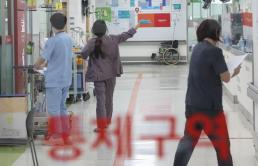
![[르포] 중력 6배에 짓눌려 기절 직전…전투기 조종사 비행환경 적응훈련(영상)](https://image.ajunews.com/content/image/2024/02/29/20240229181518601151_258_161.jpg)
